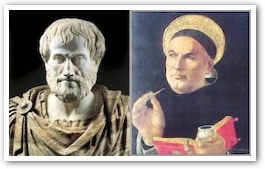Aristotle and Aquinas: The Vital Difference
- DONALD DEMARCO
An easy but accurate way of distinguishing the ethics of Aristotle from that of Aquinas lies in examining the fundamental questions they ask.
 |
Aristotle's ethics is the protracted answer to three basic questions:
(1) Who am I? (2) How should I live? (3) Where am I going?
To these questions, Aristotle responds by explaining that we are social beings; that we should live a life of virtue in accordance with reason; and that our end is happiness.
Aristotle's ethics is very sensible. He elaborates on the fact that we are social beings who, if we are to achieve happiness, must be reasonable and live a life of virtue. If there is a flaw or weakness in this scheme, it is because Aristotle assigns reason far more prominence than love. We know that a cunning person who is not concerned about behaving ethically can employ reason in ways that are not virtuous. Reason, then, does not guarantee virtue.
Aquinas asks four questions:
(1) Who am I? (2) What should I do? (3) How can I do what I should do? (4) Where am I going?
Aquinas answers the first question, in effect, by explaining that we are simultaneously unique individuals as well as socially responsible beings. In a word, we are persons. What we should do, essentially, is love. The way we express love is through virtue. If we are bereft of virtue, we are unable to express love. Finally, our destiny is happiness (beatitude) that begins in this world, but is consummated with God.
The difference between the ethics of Aristotle and Aquinas has to do with how virtue comes about. It is reasonable to be virtuous. Surely "honesty is the best policy." That is simply a reasonable statement that does not require love. And virtue, for Aristotle, lies between two extremes. Thus, the virtue of courage, for example, is the midpoint between the vices of timidity and foolishness. This is all very sensible, though something is missing.
Perhaps Aristotle overestimated our capacity to be reasonable and under-estimated the importance of love. Whereas Aristotle links virtue to reason, Aquinas links it more properly to love. Therefore, as the Angelic doctor states, "Love is the form of all virtues." This means that every virtue derives its degree of virtuousness by its association with love.
In his book The Four Loves, C. S. Lewis refers to a poem entitled, "Love Is Enough" and the critic who is said to have responded to it by stating, tersely, "It isn't." Just as virtue needs love as its root, love needs virtue for its mode of expression. Aquinas asked and responded to the core question that Aristotle tended to ignore: "How can I be virtuous (since reason does not always direct me to what is good)?"
Aristotle had the right outline, but Aquinas filled in a critical gap. The Christian attitude seems more realistic than the pagan one. St. Paul tells us how he agonized over the fact that he was neglectful in doing what he should do and guilty of doing the evil he knew he should avoid. We read in Matthew 26: 41, "Watch and pray so that you will not fall into temptation. The spirit is willing, but the flesh is weak." We need not only love, but grace, as well, in order to be virtuous.
A handy way of putting it is that love for others evolves in three stages: attentiveness, appreciation, and affection. |
Many of today's self-help books proceed from the assumption that it is reasonable to do the virtuous thing and unreasonable to do the opposite. But rational man does not become virtuous by reading a book, though a book might set him on the right path. He becomes virtuous when he is able to love.
This leads to an additional question: "How do we find love?" First, we possess love because we are made in the image of a loving God. Therefore, we are capable of love. Love becomes animated when we perceive the good of others and desire to protect and promote that good. Turning from our concerns about ourselves and looking at the needs of others is an effective means of animating our love, bringing it out of dormancy, and preparing it for virtuous expression.
A handy way of putting it is that love for others evolves in three stages: attentiveness, appreciation, and affection.
First, we pay attention to the other person and discern who he is and what is affecting him. When we do this, we begin to develop empathy and a regard for the value of the other person. Finally, we express affection for the person in a proper way. An encouraging word or a pat on the back or a helpful suggestion are all good examples of affection. Love between husband and wife represents a paradigm for expressing affection.
Love should not be as difficult as we often make it out to be. We are persons called to love others and express our love effectively and properly through virtue. If we can do this, we are well on the way to happiness, even though happiness is not our primary goal.
 This is Meaghen Gonzalez, Editor of CERC. I hope you appreciated this piece. We curate these articles especially for believers like you.
This is Meaghen Gonzalez, Editor of CERC. I hope you appreciated this piece. We curate these articles especially for believers like you.
Please show your appreciation by making a $3 donation. CERC is entirely reader supported.

Acknowledgement
Donald DeMarco. "Aristotle and Aquinas: The Vital Difference." Truth & Charity Forum (December 13, 2012).
This article is reprinted with permission from HLI America.
HLI America is a Catholic educational apostolate to the United States, which is dedicated to promoting the true dignity of the person, to defending authentic human rights, and to fostering the good of marriage and the family.
The Author






